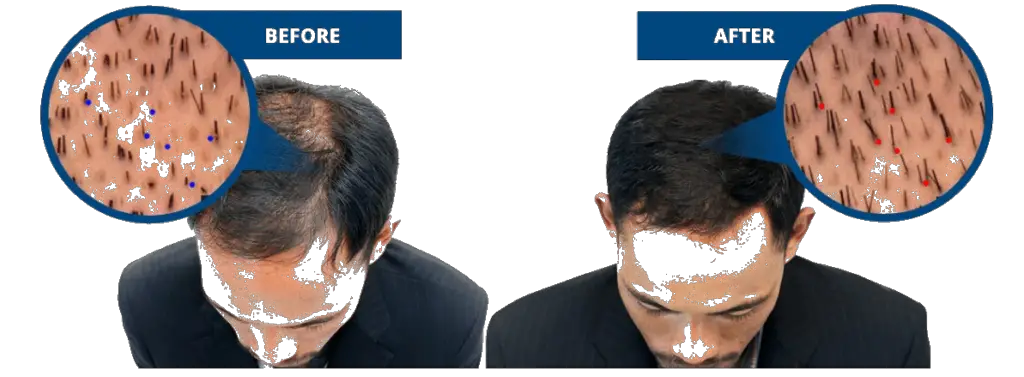Have you ever wondered, does hair decompose? It’s a question that might seem odd at first, but it’s actually quite relevant, especially when considering environmental impacts and the cycle of life. In this comprehensive guide, we’ll delve into the fascinating world of hair decomposition, exploring everything from the science behind it to the factors that influence the process. So, whether you’re a curious individual, a budding scientist, or someone interested in the environment, this article is for you. Let’s embark on this intriguing journey together.
Key Takeaways
In our exploration of hair decomposition, we’ve uncovered some fascinating insights. Here are the key takeaways from our discussion:
- Hair Does Decompose: Despite common myths, hair does decompose. However, the process is slow due to the robustness of keratin, the protein that hair is made of.
- Environment Matters: The environment in which hair finds itself can significantly influence how quickly it decomposes. From septic tanks to coffins, different conditions can either slow down or speed up the decomposition process.
- Hair in Drains and Septic Tanks: Hair can decompose in drains and septic tanks, but the process is slow. Over time, hair can accumulate and mix with other substances, potentially leading to blockages.
- Hair in Soil and Compost: Hair can decompose in soil and compost piles. In fact, hair is rich in nitrogen, an essential nutrient for plants, making it a beneficial addition to compost piles.
- Hair Decomposition in Water: Hair can decompose in water. However, the water’s temperature, pH level, and microbial activity can influence the speed of decomposition.
- Understanding Hair is Key to Hair Care: Understanding the lifecycle of hair, including its decomposition process, can lead to better hair care and a deeper appreciation of this remarkable part of our bodies.
Before we dive in, you might want to check out our article on Is Mature Hairline Balding? for some interesting insights on hair growth and loss.
What is Hair Decomposition?
Hair decomposition is a natural process where hair breaks down over time. This process is significantly slower than the decomposition of many other biological materials, primarily due to the presence of keratin, a robust protein that gives hair its strength. But what exactly happens during this process? And what factors influence it? Let’s find out.
For more information on hair and its characteristics, our article on Is Norwood 2 Balding? provides some enlightening details.
Does Hair Decompose?
Yes, hair does decompose, but it’s a slow process. The decomposition of hair is influenced by various factors, including the environment and the presence of specific microorganisms. Here’s a more in-depth look at these factors:
- Role of Water in Hair Decomposition: Water can accelerate the decomposition process by facilitating the growth of microorganisms that break down keratin. However, hair is not very porous, which means it doesn’t absorb water well, slowing down the process.
- Impact of Soil on Hair Decomposition: Soil can provide a conducive environment for the microorganisms that aid in hair decomposition. However, the type of soil and its properties can influence the speed of the process.
- Effect of Air on Hair Decomposition: Exposure to air can either speed up or slow down hair decomposition, depending on the specific conditions. For instance, dry air can preserve hair, while humid air can accelerate decomposition.
For a deeper understanding of how hair reacts to different conditions, our article on Thin Crown offers some valuable insights.
How Long Does It Take for Hair to Decompose?
When it comes to the question, how long does it take for hair to decompose, the answer isn’t straightforward. The decomposition timeline of hair can vary significantly, depending on several factors. Let’s delve into these factors and how they influence the decomposition timeline:
- Human Hair vs. Animal Hair Decomposition: The decomposition rate can vary between human hair and animal hair. For instance, dog hair and cat hair may decompose at different rates due to their unique structures and environments.
- Decomposition of Hair in Different Environments: The environment in which hair is located can significantly influence how long it takes to decompose. For example, hair in soil or water may decompose faster than hair exposed to air.
To understand more about the unique characteristics of human hair, you might find our article on Reverse Male Pattern Baldness Naturally quite enlightening.
Human Hair vs. Animal Hair Decomposition
Human hair and animal hair, while similar in many ways, have distinct differences that can affect their decomposition rates. For instance, the structure, thickness, and chemical composition of human hair can differ from that of various animals, influencing how quickly they decompose.
If you’re interested in learning more about the differences between human and animal hair, our article on Blocking DHT Side Effects provides some fascinating insights.
Decomposition of Hair in Different Environments
The environment in which hair is located plays a significant role in its decomposition process. For instance:
- Soil: Hair buried in soil may decompose faster due to the presence of microorganisms that break down keratin. The type of soil and its properties can also influence the speed of the process.
- Water: Hair in water can decompose at different rates depending on the water’s temperature, pH level, and microbial activity.
- Air: Exposure to air can either speed up or slow down hair decomposition, depending on the specific conditions. For instance, dry air can preserve hair, while humid air can accelerate decomposition.
For more information on how different environments can affect hair, check out our article on The Genetics of Balding.
Hair Decomposition After Death
One of the most intriguing questions people often ask is, does hair decompose after death? The answer is yes, but the process is much slower than most other biological materials. This slow decomposition rate has led to a common myth that hair continues to grow after death. Let’s debunk this myth and understand what truly happens to our hair after we pass away.
For a deeper understanding of hair growth and loss, you might want to read our article on The Genetics of Balding.
The Myth of Hair Growth After Death
The idea that hair continues to grow after death is a long-standing myth. The truth is, hair growth requires a series of active biological processes that cease upon death. What actually happens is that the skin around the hair may dehydrate and retract after death, making the hair appear longer when it’s not.
If you’re interested in more hair-related myths and facts, our article on Balding Genetics offers some fascinating insights.
What Happens to Hair After Death
After death, the hair remains intact for a long time due to the robustness of keratin, the protein that hair is made of. However, over time, given the right conditions, hair will eventually decompose. This process can take many years, even centuries, depending on environmental conditions.
For more information on the lifecycle of hair, our article Hair Loss 101 provides a comprehensive overview.
Hair Decomposition in Different Scenarios
Hair decomposition can vary greatly depending on the scenario. From septic tanks to coffins, the environment in which hair finds itself can significantly influence how quickly it decomposes. Let’s explore some of these scenarios in more detail.
Hair Decomposition in Septic Tanks
Septic tanks are a common place where hair ends up, especially due to hair loss during showers. But does hair decompose in septic tanks? The answer is yes, but very slowly. The decomposition process in septic tanks is primarily anaerobic (without oxygen), which is not ideal for the bacteria that break down keratin, the primary component of hair. As a result, hair can accumulate in septic tanks over time, potentially leading to blockages.
For more information on how hair can impact your home’s plumbing, our article on Blocking DHT Side Effects provides some valuable insights.
Hair Decomposition in Drains
Hair is a common cause of drain blockages. But does hair decompose in drains? Similar to septic tanks, hair can decompose in drains, but the process is slow due to the robustness of keratin. Over time, hair can accumulate and mix with other substances in the drain, leading to clogs.
If you’re interested in learning more about how to prevent hair-related drain issues, our article on Reverse Male Pattern Baldness Naturally offers some useful tips.
Hair Decomposition in Coffins
Another common question is, does hair decompose in coffins? In a sealed coffin, the lack of oxygen and the presence of dark and cool conditions can slow down the decomposition process. As a result, hair can remain intact for many years, even centuries, after burial.
Hair Decomposition in Compost
Composting is a popular method of recycling organic waste. But does hair decompose in compost? Yes, hair can decompose in compost piles, but the process is slow due to the toughness of keratin. However, hair is rich in nitrogen, an essential nutrient for plants, making it a beneficial addition to compost piles.
Frequently Asked Questions About Hair Decomposition
In our exploration of hair decomposition, several questions often arise. In this section, we’ll address some of the most frequently asked questions about this intriguing topic.
For a deeper understanding of hair and its lifecycle, you might want to read our article on Hair Loss 101.
Does Hair Decompose After Being Cut?
Yes, cut hair does decompose. However, the decomposition process is slow due to the robustness of keratin, the protein that hair is made of. Whether the hair is attached to the scalp or not does not significantly influence the decomposition process.
For more information on hair growth and loss, our article on Is Mature Hairline Balding? provides some enlightening details.
How Fast Does Hair Decompose?
The speed at which hair decomposes can vary greatly, depending on several factors such as the environment and the presence of specific microorganisms. However, due to the robustness of keratin, the decomposition process is generally slow.
If you’re interested in learning more about the decomposition process, our article on Blocking DHT Side Effects offers some fascinating insights.
Does Hair Decompose in Soil?
Yes, hair can decompose in soil. The decomposition process is facilitated by microorganisms in the soil that can break down keratin. However, the type of soil and its properties can influence the speed of the process.
For more information on how different environments can affect hair, check out our article on The Genetics of Balding.
Does Hair Decompose in Water?
Yes, hair can decompose in water. However, the decomposition process is slow due to the robustness of keratin. The water’s temperature, pH level, and microbial activity can influence the speed of decomposition.
For more information on how water can affect hair, our article on Is Norwood 2 Balding? provides some enlightening details.
Conclusion
Understanding the decomposition process of hair can be both fascinating and enlightening. From debunking myths to exploring different scenarios, we’ve delved into the world of hair decomposition. We’ve learned that while hair does decompose, the process is slow due to the robustness of keratin, the protein that hair is made of.
Whether it’s in a septic tank, a drain, a coffin, or a compost pile, hair can remain intact for years, even centuries. However, given the right conditions and enough time, hair will eventually decompose. This knowledge can be useful in various fields, from forensics to waste management.
Remember, hair care is not just about maintaining its appearance but also understanding its lifecycle and how it interacts with the environment. For more insights into hair health and care, check out our article on Hair Breakage at Crown.
As we continue to explore the world of hair, we invite you to join us in our journey. Whether you’re curious about the Back of Bald Head or interested in learning how to Balding at the Crown, we’ve got you covered.
Thank you for joining us in this exploration of hair decomposition. We hope you found this article informative and engaging. Remember, every strand of hair has its own story to tell, and understanding these stories can lead to better hair care and a deeper appreciation of this remarkable part of our bodies.
- AI Powered Bald Filter Online 2024: See Yourself with No Hair! - January 19, 2024
- Harklinikken Bad Reviews 2024: Analyzing Negative Feedbacks - January 18, 2024
- How to Get the Alex Eubank Hair | Step-By-Step Tutorial 2024 - January 18, 2024







